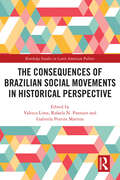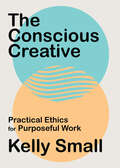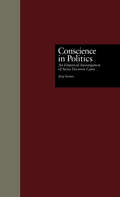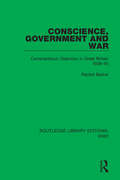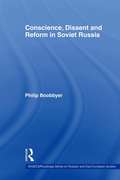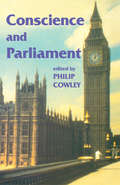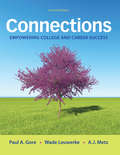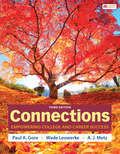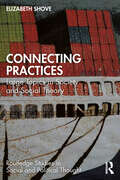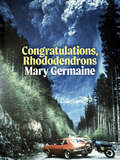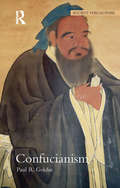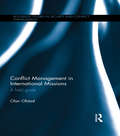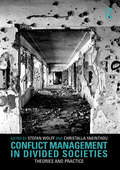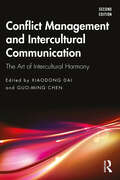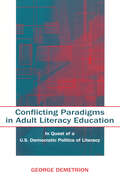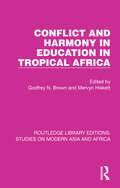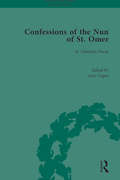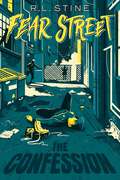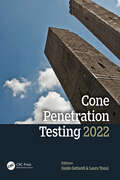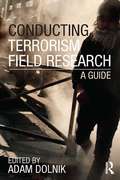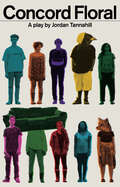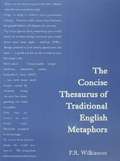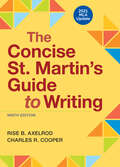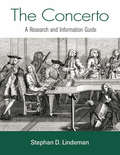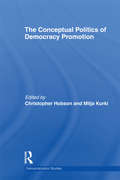Special Collections
Benetech’s Global Certified Accessible Titles
Description: Benetech’s GCA program is the first independent third-party EPUB certification to verify ebook accessibility. By creating content that is born accessible, publishers can meet the needs of all readers. Learn more: https://bornaccessible.benetech.org/
- Table View
- List View
The Consequences of Brazilian Social Movements in Historical Perspective
by Valesca Lima, Rafaela N. Pannain and Gabriela Pereira MartinsThis book sheds light on the outcomes of social movement in Brazil. It provides an extensive analysis of how and when collective mobilization and protest activities brought about social and political change. Charting the dynamics and characteristics of Brazil’s social movements from the abolition of slavery in 1888 to the present day, the contributors to this edited volume demonstrate the processes of social movement activism in Brazil, and its relations with political institutions across various types of governments and political regimes. They bring to light both political opportunity structures of different historical periods, and the political and cultural consequences of mobilization stemming from the collective action of social movements. Showcasing various approaches, the book encompasses a plurality of methodological perspectives including network analysis, collective memory, trajectories, and quantitative techniques of process analysis. Ultimately, the authors present new empirical evidence about social movement outcomes in Brazil, including the mobilization for housing rights, institutionalization processes in a re-democratized society, the effects of anti-dictatorship movements on activists, transformations of political agendas and the diffusion of social protests. Interdisciplinary at its core and highly engaging, The Consequences of Brazilian Social Movements in Historical Perspective offers essential reading on social movement studies to academics, activists and students.
The Conscious Creative
by Kelly SmallAn actionable guide to mindfulness and practical ethics for any creative professional who wants to make a living without selling their soul.It can be difficult to live according to our values in a complicated world. At a time when capitalism seems most unforgiving but the need for paying work remains high, it is important to learn how we can be more mindful and intentional about our impact — personal, social, economic, and environmental.As designer and creative director Kelly Small had to do to navigate a crisis of ethics and burnout in their career in advertising, we can admit our complicity in problematic systems and take on the responsibility of letting our own conscience guide our decisions.Start with one or many of these 100+ rigorously researched, ultra-practical action steps:Co-create and collaborateGet obsessed with accessibilityDemand diverse teamsCommit to self-careMake ethics a competitive edgeBe mindful of privilegeCreate for empowerment, not exploitationWith a humorous and irreverent tone, Small reveals how when we release unnecessary judgement and become action-oriented, we can clarify the complicated business of achieving an ethical practice in the creative industries. Discover the power of incremental, positive changes in our daily work-lives and the fulfillment of purposeful work.
Conscience in Politics
by Jurg SteinerFirst published in 1996. Routledge is an imprint of Taylor & Francis, an informa company.
Conscience, Government and War
by Rachel BarkerThis book, first published in 1982, is a systematic and detached analysis of the 60,000 British conscientious objectors in the Second World War, forming an examination of the relationship between the individual and the State in time of war. It sets out to show how the British Government dealt with the challenge that conscientious objectors posed and how far it was able to correct the abuses and injustices that occurred in the First World War. It traces the background of pacifism between the Wars and the introduction of conscription, and gives a detailed account of the functioning of the Conscientious Objectors’ Tribunals and an assessment of their work. It goes on to examine the reactions and attitudes of Tribunal members, employers and the rest of the population, and how these were affected by the Government lead. It recounts the experience of objectors in civilian life and private and public employment, and how they fared in the armed forces and prisons. It also assesses the contributions made by the voluntary organisations who helped conscientious objectors in the war.
Conscience, Dissent and Reform in Soviet Russia
by Philip BoobbyerThis book embraces the political, intellectual, social and cultural history of Soviet Russia. Providing a useful perspective of Putin’s Russia, and with a strong historical and religious background, the book: looks at the changing features of the Soviet ideology from Lenin to Stalin, and the moral universe of Stalin's time explores the history of the moral thinking of the dissident intelligentsia examines the moral dimension of Soviet dissent amongst dissidents of both religious and secular persuasions, and includes biographical material explores the ethical assumptions of the perestroika era, firstly amongst Communist leaders, and then in the emerging democratic and national forces.
Conscience and Parliament
by Philip CowleyConsidering how the British policy process deals with "conscience" issues, this book covers eight topics discussed by Parliament in the last quarter of a century - abortion, censorship, divorce, Sunday trading, homosexuality, war crimes, disability rights and animal welfare.
Connections
by Wade Leuwerke and A. J. Metz and Paul GoreConnections is an innovative program, built from the ground up with a growth-mindset approach to college and career success. Written by counseling psychologists Paul Gore, Wade Leuwerke, and A.J. Metz, Connections shows students from day one how to be learners, whose mindset, drive, and strengths will help them meet any challenge on their way to college, personal, and career success. The expertly designed program is firmly rooted in the most current research in positive psychology, using self-reflection as a tool for goal-setting; goal-setting as a tool for imagining one's potential; and imagining one's potential as the motivation for realizing it. Connections puts students at the center of their own personalized learning path, facilitates their purposeful choice of an academic and career plan, and develops all the skills they need--cognitive and non-cognitive, academic and life--to foster their self-growth and success. Built around the most common issues faced in the classroom, LaunchPad for Connections, Second Edition gives students everything they need to prepare for class and exams, including author-developed digital tools linked directly to the eBook, the ACES student self-assessment (taken at the start and end of term), and our acclaimed LearningCurve adaptive quizzing. For instructors, LaunchPad offers everything they need to quickly set up a course, customize the content, prepare presentations and lectures, assign and assess homework, and guide the progress of individual students and the class as a whole.
Connections
by Paul A. Gore and Wade Leuwerke and A. J. MetzWritten by counseling psychologists Paul Gore, Wade Leuwerke, and A.J. Metz, Connections shows students from day one how to develop the mindset, drive, and strengths needed on their way to college, personal, and career success. The expertly designed program is firmly rooted in current research in positive psychology, using self-reflection as a tool for goal-setting; goal-setting as a tool for imagining one's potential; and imagining one's potential as the motivation for realizing it. Connections puts students at the center of their own personalized learning path, facilitates their purposeful choice of an academic and career plan, and develops all the skills they need--cognitive and non-cognitive, academic and life--to foster their self-growth and success.The thoroughly updated new edition addresses current challenges and research, including the growth of online learning (Appendix: Online Learning), diversity and inclusion (revised Chapter 11: Social Belonging), and the science of learning (revised Chapter 5: Understanding Thinking and Learning). These updates are reflected in a new version of ACES—the powerful, state-of-the-art student self-assessment the authors revised concurrently with Connections.
Connecting Practices
by Elizabeth ShoveConnecting Practices develops a distinctive method of conceptualising significant trends and global issues including environmental sustainability and inequalities in wealth and health, arguing that these are outcomes of the ways in which social practices interact and combine across space and time. Engaging with the question of how connections are made between practices and how past and present combinations make some futures more likely than others, this book brings practice theory to bear on large problems in society. Richly illustrated with examples from the spreading of germs to the history of shipping containers, this powerful analysis of how societies hang together and how they change will appeal to scholars and students of sociology and social theory.
Congratulations, Rhododendrons
by Mary GermaineIn her debut collection, Congratulations, Rhododendrons, award-winning poet Mary Germaine offers love poems to an insistently unlovely world.Through poems that speak to plastic bags and drones as much as they admire roses and the moon, Germaine surfs the confluence of artificial and natural environments, technology, and our small but consequential feelings about them. At turns devotional and suspicious, these poems toe the boundaries of intimacy, responsibility, and reason.In anxious times, anything can be taken as a sign; a crow, a talking coin, and a news report are all sources of information whose truth (or “fake-ness”) demand investigation. Germaine’s poems scroll from a shrine in Lourdes to an augmented-reality sandbox, from a mall filled with loitering ex–love interests to a fairy-tale ending where all the men turn out to be chairs. Funny, provocative, sly, and melancholic, Congratulations, Rhododendrons makes a case for the hope that every apparent disaster of social investment might in the end be redeemed as meaningful, genuine, or at least in some way helpful.
Confucianism
by Paul R. Goldin"Confucianism" presents the history and salient tenets of Confucian thought, and discusses its viability, from both a social and a philosophical point of view, in the modern world. Despite most of the major Confucian texts having been translated into English, there remains a surprising lack of straightforward textbooks on Confucian philosophy in any Western language. Those that do exist are often oriented from the point of view of Western philosophy - or, worse, a peculiar school of thought within Western philosophy - and advance correspondingly skewed interpretations of Confucianism. This book seeks to rectify this situation. It guides readers through the philosophies of the three major classical Confucians: Confucius (551-479 BCE), Mencius (372-289 BCE?) and Xunzi (fl. 3rd cent. BCE), and concludes with an overview of later Confucian revivals and the standing of Confucianism today.
Conflict Management in International Missions
by Olav OfstadThis book serves primarily as a field guide and curriculum for organisations training personnel for conflict management missions abroad. Currently, a gap exists between practitioners and academia in the field of conflict management and peacebuilding. Few practitioners have studied conflict management, and few academics have experience as field workers. Conflict literature contains a range of important insights and analyses, but is useful only to a limited degree to practitioners. This book provides practitioners with a much needed guidebook which is easy to understand, academically solid and which identifies with their mission and helps them relate to real-time challenges in the field. The book focuses on a number of case studies, including peacebuilding efforts in East Timor, and offers a range of practical advice for persons about to embark on a mission, from the receipt of an appointment to establishment in the field and encountering the realities and practical challenges that handling conflicts may imply. This book will be of much interest to students of conflict management, peacebuilding and conflict resolution, as well as practitioners in the field.
Conflict Management in Divided Societies
by Stefan Wolff and Christalla YakinthouThis exciting and innovative new textbook takes a multi-perspective approach to the study of conflict management in divided societies. Offering a wide range of perspectives from the leading experts in the field, the work explains conflict management from the viewpoint of the political scientist, the constitutional architect, the activist, and the NGO. It examines the philosophies underpinning constitutional design, the actors and processes involved, and the practicalities of the settlement process, combining conceptual and theoretical contributions with empirical case studies. In so doing, it provides a comprehensive global introduction to the study of conflict management in divided societies. Features & benefits of the textbook: Clearly explains the theories underpinning constitutional design including power sharing/liberal consociationalism, centripetalism, power dividing, and territorial solutions Surveys the key actors and processes involved in designing and implementing peace including the evolution of diplomacy in peace-making, and separate chapters about crafting solutions for divided societies from the perspectives of NGOs, the UN, EU and AU Explores the realities on the ground with chapters written by activists and practitioners which draw on their experience of working in conflict zones Written in a clear and engaging style, this work is essential reading for all students of conflict resolution.
Conflict Management and Intercultural Communication
by Guo-Ming Chen and Xiaodong DaiConflict management and harmony building are two key issues of intercultural communication research and merit particular attention in the globally interconnected world. In the expanded second edition, the book explores the effective ways to manage intercultural conflict and develop intercultural harmony, and takes an interdisciplinary approach to address the two issues. The book begins with the theoretical perspectives on conflict management and harmony building. It examines intercultural communication ethics, diversity and inclusion, conflict resolution, conflict face negotiation, and intercultural competence. It presents both Western and non-Western perspectives. The book then addresses in its second section conflict management and harmony building in specific contexts. These include communication in intergenerational relationships, multinational corporations, and virtual spaces, and covers a range of national cultures including the USA, Japan, Germany, and China. Drawing on the current research findings, this book covers the major theoretical perspectives and provides for a wide range of discussions on intercultural conflict management. It is a crucial reference for teachers, students, researchers, and practitioners alike.
Conflicting Paradigms in Adult Literacy Education
by George DemetrionThe book provides a historical overview of adult literacy theory, policy, practice, and research from the mid-1980s to the present. The main focus is a descriptive analysis of three distinctive schools of literacy: the Freirean-based participatory literacy movement grounded in oppositional politics and grass-roots community activism; the British-based New Literacy Studies that focuses on the ways in which diverse students utilize various literacy practices in their daily lives; and the U.S. federal government's focus on functional literacy linked to a 45-year policy emphasis on workforce readiness. These three schools of thought lead to substantially different implications over such critical areas as curriculum, assessment and accountability, and the socio-cultural role of literacy, policy, and political culture, which are discussed throughout the chapters of the book. This discussion includes a chapter on research traditions that closely parallels these perspectives on literacy education.Demetrion argues that unless values grounded ultimately in political culture emerge, it is exceedingly unlikely that the adult literacy field will be able to move from its current marginalized status toward that of achieving the level of public and policy legitimacy many believe it needs for its long-term institutional flourishing. It is argued that any settlement of this issue must be accomplished in the field of practice rather than the ground of theory, even as theoretical insight can help to frame the issues.Conflicting Paradigms in Adult Literacy Education: In Quest of a U.S. Democratic Politics of Literacy speaks to a wide audience, including not only the adult literacy community, but anyone interested in educational theory, practice, policy, research traditions, or political culture, and more fundamentally, in their intersection. Given the breadth of the topics covered, as well as the broad scope of the argument, the book is also meant for those who would like to gain a useful perspective on contemporary U.S. culture, through the window of these conflicting tensions within the field of adult literacy education.
Conflict and Harmony in Education in Tropical Africa
by Godfrey N. Brown and Mervyn HiskettOriginally published in 1975, this book was something of a pioneering study. It examines the three main traditions of African educational development – indigenous, Islamic and ‘Western’ – and the resulting harmonies and conflicts that arise from these traditions. Its contributors are all specialists writing about their own particular area of interest covering many countries of tropical Africa. They include a number of well-known African scholars as well as some comparatively new names in the field of African Studies at the time. A feature of the book is the attention that it gives to the education of women – an aspect of ‘nation-building’ that had often been rather neglected. This study is an inter-disciplinary work, calling into contribution History, Sociology, Anthropology, Law, Linguistics, and Medicine, as well as Education. It seeks to show how complex the educational situation is in Africa – and how this complexity needs to be appreciated as a background to educational planning. Nobody who has read this volume will be inclined to dismiss educational reform in Africa as ‘a relatively simple matter’ – a point of view too frequently implied by those who have not studied the subject in depth. ‘Off with the old – on with the new’ cannot be so easily implemented as critics within and without the continent sometimes seem to think. More constructively, however, this volume provides many useful insights into ways in which social tension may be reduced and harmony promoted in, and through, education. Although it is likely to be of most immediate value to those who are concerned with African education and its administration (especially in teacher-education), the book constitutes a significant contribution to understanding problems of ‘development’.
Confessions of the Nun of St Omer
by Lucy CoganCharlotte Dacre’s debut novel Confessions of the Nun of St Omer (1805) was a bestseller in its day, launching the career of a woman who would go on to become one of the nineteenth century’s most notorious female novelists. The work tells the story of the wilful Cazire, who recounts her passionate and destructive youthful adventures from the convent where she now lives in seclusion. Although Dacre’s fame, then and now, rests largely on her sensationalist plots and portrayal of sexually self-possessed female villains, Confessions of the Nun of St. Omer shows a different side to her writing, one that is engaged in the political debate surrounding the French Revolution and eager to uphold the conservative moral line. Indeed, in many ways the novel strives to exemplify the moral and social orthodoxies of its time – dealing with themes of education, passion, seduction and the dangers of the radical ‘new philosophy’. Yet even at this early stage of her career the author’s frank exploration of the power of female desire reveals a willingness to experiment with themes left untouched by more conventional Romantic era novelists, themes that would dominate her writing for years to come. This edition of Charlotte Dacre’s book is based on the Chawton House Library copy of the text from 1805 and contains textual notes. The book will be of interest to those researching the Gothic, women’s writing and the development of the nineteenth-century novel.
The Confession
by R. L. StineJulie's friends couldn't stand Al. In fact, they all wished Al were dead. But that doesn't mean one of them killed him. Julie knows her friends. She knows they're innocent...until one of them confesses to the murder. Julie and her friends make a pact to keep the killer's secret. They're sure it was a one-time thing. It will never happen again. ...Will it?
Cone Penetration Testing 2022
by Guido GottardiThis abstracts volume (including full keynote and invited papers) contains the proceedings of the 5th International Symposium on Cone Penetration Testing (CPT’22), held in Bologna, Italy, 8-10 June 2022. More than 500 authors - academics, researchers, practitioners and manufacturers – contributed to the peer-reviewed papers included in this book, which includes three keynote lectures, four invited lectures and 169 technical papers. The contributions provide a full picture of the current knowledge and major trends in CPT research and development, with respect to innovations in instrumentation, latest advances in data interpretation, and emerging fields of CPT application. The paper topics encompass three well-established topic categories typically addressed in CPT events: - Equipment and Procedures - Data Interpretation - Applications. Emphasis is placed on the use of statistical approaches and innovative numerical strategies for CPT data interpretation, liquefaction studies, application of CPT to offshore engineering, comparative studies between CPT and other in-situ tests. Cone Penetration Testing 2022 contains a wealth of information that could be useful for researchers, practitioners and all those working in the broad and dynamic field of cone penetration testing.
Conducting Terrorism Field Research
by Adam DolnikThis book offers a detailed and practically oriented guide to the challenges of conducting terrorist fieldwork. The past decade has seen an explosion of research into terrorism. However, field research on terrorism has traditionally been surrounded by many myths, and has been called anything from "necessary" and "crucial" to "dangerous", "unethical" and "impossible". While there is an increasing interest among terrorism specialists in conducting such research, there is no single volume providing prospective field researchers with a guideline to such work. Conducting Terrorism Field Research aims to fill this gap and offers a collection of articles from experienced authors representing different risk groups, disciplines, methodological approaches, regional specializations, and other context-specific aspects. Each contributor provides a road-map to their own research, describing planning and preparation phases, the formalities involved in getting into conflict zones and gaining access to sources. The end product is a 'how to' guide to field research on terrorism, which will be of much value to terrorism experts and novices alike. This book will be of much interest to students and researchers of terrorism studies, war and conflict studies, criminology, IR and security studies.
Concord Floral
by Jordan TannahillConcord Floral is a one-million-square-foot abandoned greenhouse and a refuge for neighbourhood kids; a place all to themselves in which to dream, dare, and come of age. But hidden there is a secret no one wants to confront, and when two friends stumble upon it they set off an unstoppable chain of events, from shadows in parking lots to phone calls from the grave. It's time for the teens of Concord Floral to start talking.
Concise Thesaurus of Traditional English Metaphors
by Dick WilkinsonThis absorbing collection of metaphors includes a variety of expressions with figurative meanings, like similes, proverbs, slang and catchphrases. It is the result of a lifetime of work on dialect and metaphor and gives an overview of the folk wisdom expressed in figurative expressions. The author draws on his extensive contact with the rural cultures of Dorset, Cornwall, Yorkshire and Lancashire, but has also included a range of sayings from North America, Australia, Scotland and other English speaking countries. With revised contents and an improved index to make individual entries easier to find, the Concise can be used to check the meaning and the origin of an expression or to avoid mixed metaphors, anachronisms and incongruities. It is a joy to browse long after your original query has been answered.
The Concise St. Martin's Guide to Writing with 2021 MLA Update
by Rise Axelrod and Charles CooperThis ebook has been updated to provide you with the latest guidance on documenting sources in MLA style and follows the guidelines set forth in the MLA Handbook, 9th edition (April 2021). The Concise St. Martins Guide provides step-by-step guides to writing and reading to help you learn those essential skills and apply them to all of your college courses.
The Concerto
by Stephan D. LindemanTwelve-tone and serial music were dominant forms of composition following World War II and remained so at least through the mid-1970s. In 1961, Ann Phillips Basart published the pioneering bibliographic work in the field.
The Conceptual Politics of Democracy Promotion
by Milja Kurki and Christopher HobsonHow do different meanings of the concept of ‘democracy’ operate in democracy promotion? How do conceptual decisions influence real political events? How is policy and reflection on democracy promotion shaped by the way different practitioners and scholars understand democracy? The Conceptual Politics of Democracy Promotion explores the way in which the meaning, content and context of ‘democracy’ are interpreted by different actors in democracy promotion, and how these influence political decisions. Introducing a theoretically new approach to the study of democracy promotion, the volume shows how the alternate ways that democracy can be understood reflects specific interpretations of political and normative ideals, as well as being closely tied to social power relations, interests, and struggles between political actors. With original contributions from some of the most prominent specialists on democracy promotion and democratization, the book examines a number of concrete cases of democracy promotion and contestation over democracy’s meaning. Re-examining democracy promotion at its time of crisis, this book will be of interest scholars and students of democracy and democratization, politics and international relations, international law, development studies and political theory.
